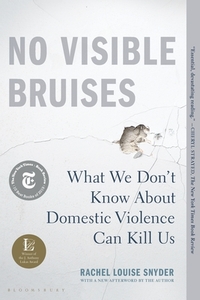Take a photo of a barcode or cover
361 reviews for:
No Visible Bruises: What We Don't Know about Domestic Violence Can Kill Us
Rachel Louise Snyder
361 reviews for:
No Visible Bruises: What We Don't Know about Domestic Violence Can Kill Us
Rachel Louise Snyder
dark
emotional
informative
reflective
sad
tense
medium-paced
There are few books that manage to highlight a complex social issue, show you just how little you understand it, AND THEN provide a litany of ways we as individuals and a society can have a huge impact right now. Snyder made me understand that domestic violence impacts every life and society, and then did something that felt amazing in a world of depressing articles and troubling news reports: she demonstrated concrete ways to make change. She gave me policies to advocate for. NO VISIBLE BRUISES allowed me to see that domestic violence isn't just a personal problem, a sad news story or a moment for empathy with a friend; it's also an economic problem, it's a domestic terrorism problem, it's a national development problem. I cannot recommend this book highly enough, and hope it is a catalyst for long overdue conversations around interpersonal violence and its lasting effects on us as individuals and as a community.
challenging
informative
sad
slow-paced
Graphic: Child abuse, Child death, Death, Domestic abuse, Drug abuse, Drug use, Emotional abuse, Gore, Gun violence, Infidelity, Mental illness, Misogyny, Rape, Sexual assault, Sexual violence, Suicidal thoughts, Suicide, Toxic relationship, Violence, Grief, Stalking, Death of parent, Murder, Sexual harassment
Moderate: Addiction, Alcoholism, Body horror, Self harm, Blood, Medical content, Kidnapping, Medical trauma, Abandonment, Alcohol
Minor: Police brutality
dark
emotional
hopeful
informative
medium-paced
Graphic: Domestic abuse, Emotional abuse, Gun violence, Rape, Murder
challenging
dark
emotional
informative
reflective
sad
slow-paced
Absolutely heartbreaking
challenging
informative
reflective
sad
slow-paced
challenging
informative
inspiring
sad
medium-paced
challenging
dark
informative
reflective
medium-paced
challenging
informative
reflective
“people think that if they can find enough variables they can do the odds ratio, put them into a formula, and spew out the cases where there’s very, very high risk, and I think that flies in the face of the complexity of the human condition” p171
Through in-depth interviews Rachel Louise Snyder explores the stories of victims, perpetrators, police officers, and other support workers whilst weaving through theories and statistics. She gives her answer to the question of ‘why do women stay’ and investigates the flip side, ‘why do abusers stay’. Despite having some previous knowledge and training on this topic, I learnt a lot about the types of programmes aimed at addressing the beliefs and conditioning male perpetrators that exist in America. The difference between anger management and specific batterer programmes, less widely used, was intriguing (I want to research into whether equivalent programmes exist in England). Another interesting section was around hostage training, and estimations that 80% of hostage situations are for domestic violence and yet is rarely at the centre of training in America!
This book was definitely an interesting first pick for my monthly non fic challenge
Through in-depth interviews Rachel Louise Snyder explores the stories of victims, perpetrators, police officers, and other support workers whilst weaving through theories and statistics. She gives her answer to the question of ‘why do women stay’ and investigates the flip side, ‘why do abusers stay’. Despite having some previous knowledge and training on this topic, I learnt a lot about the types of programmes aimed at addressing the beliefs and conditioning male perpetrators that exist in America. The difference between anger management and specific batterer programmes, less widely used, was intriguing (I want to research into whether equivalent programmes exist in England). Another interesting section was around hostage training, and estimations that 80% of hostage situations are for domestic violence and yet is rarely at the centre of training in America!
This book was definitely an interesting first pick for my monthly non fic challenge
challenging
dark
emotional
informative
inspiring
reflective
tense
medium-paced






